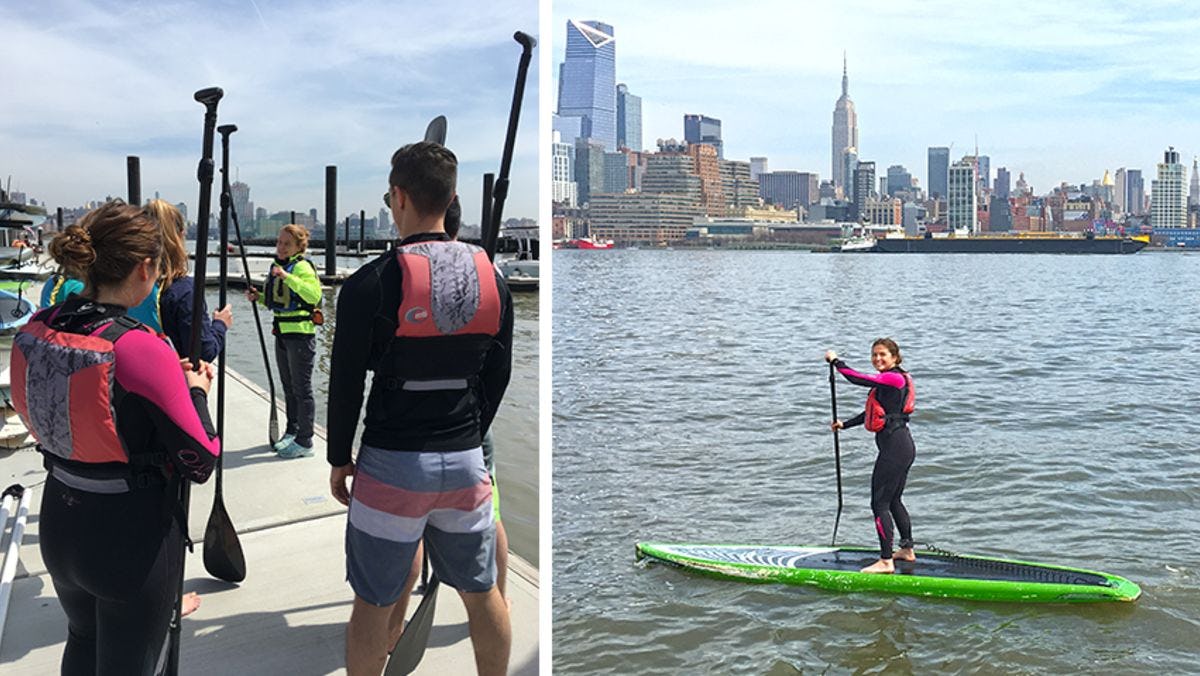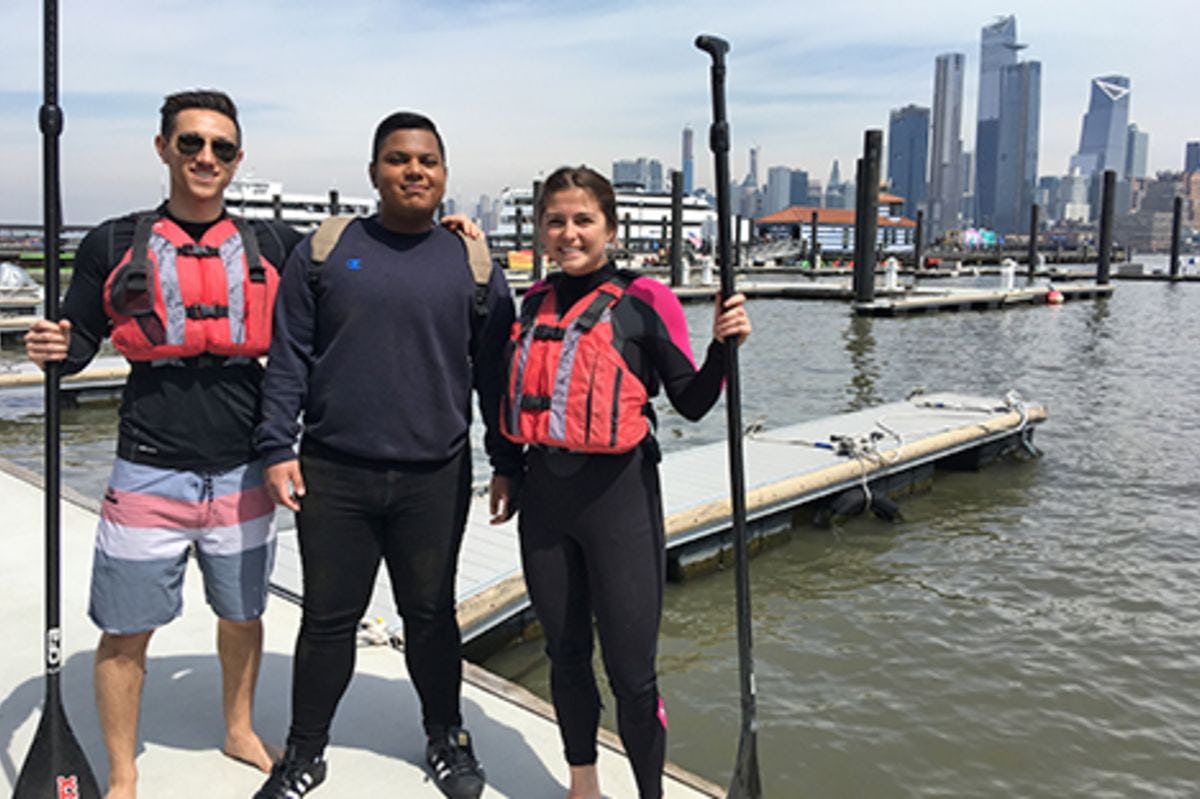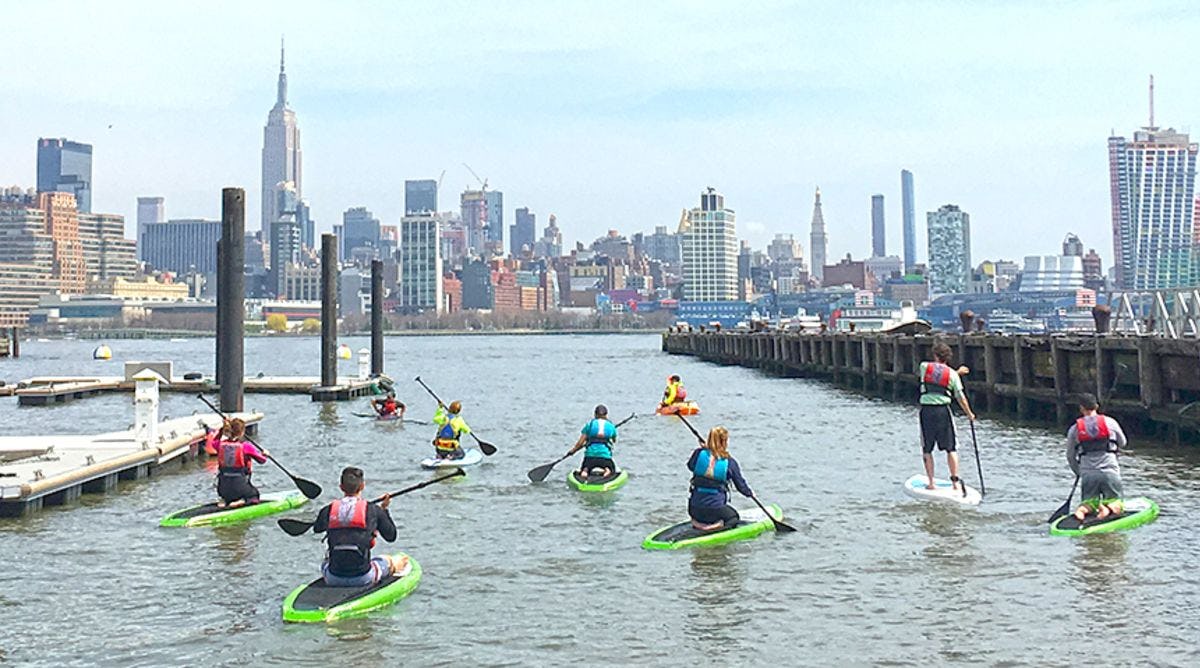On the Waterfront, with Paddles: Students Stand with Resilience to Encourage Enjoyment of River
Passion for Paddleboarding Creates Business, Research Opportunities for Hoboken Company and Course Credits for Future Undergrads
Regan Littell ’19 grew up in the Chesapeake Bay area, where you could frequently find her paddling on the water. But like many students at Stevens Institute of Technology, she didn’t see much in the way of recreational possibilities on the Hudson River, even though the campus is situated along its banks.
“There’s a lot of stigma about how the water is polluted and you shouldn’t go into it,” Littell, a Quantitative Finance student, said.
Thanks to the efforts of Littell and other business students she’s working with, that may soon change. The team partnered with Resilience Paddle Sports, of Hoboken, to raise awareness of Hudson River water sports and encourage stronger ties between the university community and the river.
Resilience owner Noelle Thurlow “has expressed so much interest working with the Stevens community, to establish classes or internship or volunteer opportunities,” said Hannah Silvestri ’19, who is studying Business & Technology.
The team has created a gym class in which Stevens students can book time slots with Resilience and fulfill physical education requirements kayaking or paddleboarding on the Hudson River.
“Stevens is now letting you do something similar with kickboxing and cycling classes,” said Silvestri, who will start her career at Protiviti after graduating. “And by scheduling directly with Noelle, you wouldn’t have to worry about weather conditions or number of people in the group.”
Thurlow said the students on the team were enthusiastic professionals who regularly updated her on their meetings with Stevens administration, including when the team ran into a couple of roadblocks around issues like safety and scheduling.
“There were moments when I wasn’t sure it would be approved, but the students made it happen,” she said. “My mission is connecting people living in urban communities to the waterway, to encourage stewardship, and they brought so much enthusiasm to what I’m trying to do.”
Battle over dry dock
The project comes at an interesting time for Resilience and Hoboken. NY Waterway is attempting to relocate a major refueling and repair site to a dock alongside Maxwell Park, within view of the Stevens campus. Resilience and local government have been fighting to move the refueling depot elsewhere in Hoboken or in another city; Thurlow and others have argued that the proposed location would damage a fragile ecosystem, further hurt perceptions of the river and end kayaking in the area.
“With everything going on around this issue, I’m glad I got involved when I did, but I wish I had started earlier,” said Littell, who accepted an offer at TD Ameritrade. “I hope that, through this project, we create ways for students to be more active with the water and the community throughout their time here.”
The students are working with members of the freshman orientation team at Stevens to have an event for incoming students on the water with Resilience, to introduce them to the riverfront early in their academic careers. They also want freshmen to one day be able to compete for internships at Resilience.
“For a lot of business students, it can be challenging to get that first-year internship,” said Andrew Caruso ’19, a Business & Technology student who’s off to Grant Thornton after commencement. “This would be a good way to stay involved on campus and see the business side of Resilience.”
Opportunities for water-quality research
The team also hopes to spark a research partnership. Thurlow does water-quality testing in the Hudson as part of her own research work; the team put her in touch with Dr. Dibyendu Sarkar of the Schaefer School of Engineering and Science, whose research is focused on environmental sustainability, particularly in rivers and coastal waters.
The wide-ranging project will be on display at the May 3 Innovation Expo, where teams of Stevens seniors showcase the results of their year-long project.
Given the many facets of their involvement, the students have relied on the presentation skills emphasized throughout their business classes to make their case to numerous stakeholders — at Resilience, at various levels in the Stevens administration, to faculty researchers, to prospective student paddlers.
“From day one to graduation, you’re doing presentations,” said Francisco Montiel ’19, who’s preparing to enroll in graduate school. “When you find yourself talking to so many professors, people and groups, those presentation skills help you to be more confident and speak out when you need to.”
The students and Resilience hope this project is the beginning of a strong relationship that continues the transformation of the Hudson.
“Stevens students are the smartest of the smartest — they’re going to be the engineers creating technologies that help us mitigate climate change effects and build the urban areas of the future,” Thurlow said. “If this continues, it would be a great way for Stevens students to both develop an appreciation for the waterfront and be mentors to younger students in Hoboken. And professors and researchers could be involved also — moving toward increased use of the waterway not just for recreation, but education, as well.”
School of Business Undergraduate Business Programs Capstone business projects





